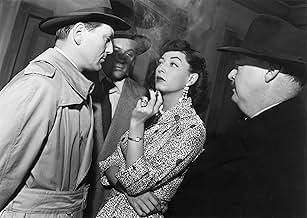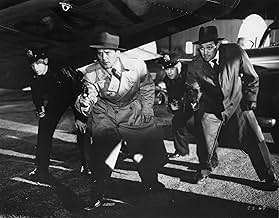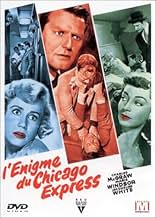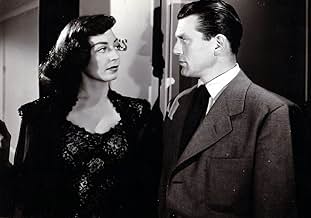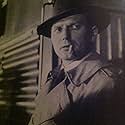IMDb रेटिंग
7.6/10
9.4 हज़ार
आपकी रेटिंग
भीड़ के खिलाफ गवाही देने की योजना बनाने वाली महिला को शिकागो से लॉस एंजिल्स की ट्रेन यात्रा पर अपने हत्यारों के खिलाफ संरक्षित होना चाहिए.भीड़ के खिलाफ गवाही देने की योजना बनाने वाली महिला को शिकागो से लॉस एंजिल्स की ट्रेन यात्रा पर अपने हत्यारों के खिलाफ संरक्षित होना चाहिए.भीड़ के खिलाफ गवाही देने की योजना बनाने वाली महिला को शिकागो से लॉस एंजिल्स की ट्रेन यात्रा पर अपने हत्यारों के खिलाफ संरक्षित होना चाहिए.
- निर्देशक
- लेखक
- स्टार
- 1 ऑस्कर के लिए नामांकित
- कुल 1 नामांकन
Peter Brocco
- Vincent Yost
- (बिना क्रेडिट के)
Ivan Browning
- Waiter
- (बिना क्रेडिट के)
George Chandler
- Accomplice Running Newsstand
- (बिना क्रेडिट के)
James Conaty
- Tenant in Apartment House Hallway
- (बिना क्रेडिट के)
Don Dillaway
- Reporter
- (बिना क्रेडिट के)
Franklyn Farnum
- Train Passenger
- (बिना क्रेडिट के)
Bess Flowers
- Wagon Restaurant Diner
- (बिना क्रेडिट के)
Don Haggerty
- Det. Wilson
- (बिना क्रेडिट के)
फ़ीचर्ड समीक्षाएं
While director Richard Fleischer gets plenty of credit for his role in making the film noir classic "The Narrow Margin" on a shoestring budget, it is hard to imagine this picture without actor Charles McGraw in the lead role. As a tough cop escorting a witness to testify in Los Angeles, McGraw's performance is what holds the picture together. Try to think now of one actor around today who could portray a cop who is at times calculating, other times sarcastic and almost always menacing. In the Hollywood of the 1940s and 50s,Charles McGraw usually played secondary roles in A pictures. In "The Narrow Margin," McGraw shows that with a competent director, he could put on some performance as the star of a movie.
Trains have it all over ships and planes when it comes to creating a microcosm. On an airplane, everybody's crammed together; nobody can sneak on or leave (except by parachute or defenestration). An ocean liner has its private staterooms and public spaces, but, again, is an island, entire onto itself. But trains stop regularly to take on and disgorge passengers, and they run along their fixed and earthbound course, with windows looking out on rivers and highways, at big cities at high noon and small towns in the dead of night. And so they've always been the preferred vehicle for suspense, with countless thrillers using the rails as their setting. One of the tautest and most toothsome, in its modest, low-budget way, is Richard Fleischer's The Narrow Margin.
It opens in Chicago, where a pair of Los Angeles police detectives are to escort the widow (Marie Windsor) of a recently slain gang leader back to the coast to testify before a grand jury. She's a hard case (`a 60-cent special...poison under the gravy'), and guarding her is a dangerous job. Sure enough, one of the cops takes a fatal bullet in the stairway of her low-rent apartment house (she shows scant sympathy). Windsor's finally smuggled aboard the train, in a Pullman car's locked compartment adjoining that of her custodian Charles McGraw. Almost certainly, one or more mobsters followed her. It's up to McGraw to smoke them out before they kill Windsor, who knows too much. But he slowly learns that some vital information has been deliberately kept from him....
Fleischer makes inventive use of the jostling in the cramped passageways and of the all but vanished rituals of club cars and dining cars. He packs the train with seasoned character actors, notable among them Jacqueline White, Paul (`Nobody loves a fat man') Maxie, and Don Beddoe. The closely worked script, by Earl Fenton (based on a novel by Martin Goldsmith, who also penned the original material for Detour), doesn't stint on gaudy patter for them to spout (it's a moveable feast of salty epigrams).
Best of all, The Narrow Margin offers the addictive Marie Windsor her meatiest role, showcasing her tough-gal talents. Rolling her huge and extraordinary eyes, she aims her exhaled smoke like a stream of deadly gas and hard-boils her lines into hand grenades (to McGraw: `This train's headed straight for the cemetery. But there's another train coming along a gravy train. Let's get on it.'). It's one of Hollywood's more perplexing secrets why Windsor toiled exclusively, with the possible exception of her Sherry Peatty in Stanley Kubrick's The Killing, in the B-movie ghetto. But she helped make that ghetto the liveliest part of Tinsel Town.
It opens in Chicago, where a pair of Los Angeles police detectives are to escort the widow (Marie Windsor) of a recently slain gang leader back to the coast to testify before a grand jury. She's a hard case (`a 60-cent special...poison under the gravy'), and guarding her is a dangerous job. Sure enough, one of the cops takes a fatal bullet in the stairway of her low-rent apartment house (she shows scant sympathy). Windsor's finally smuggled aboard the train, in a Pullman car's locked compartment adjoining that of her custodian Charles McGraw. Almost certainly, one or more mobsters followed her. It's up to McGraw to smoke them out before they kill Windsor, who knows too much. But he slowly learns that some vital information has been deliberately kept from him....
Fleischer makes inventive use of the jostling in the cramped passageways and of the all but vanished rituals of club cars and dining cars. He packs the train with seasoned character actors, notable among them Jacqueline White, Paul (`Nobody loves a fat man') Maxie, and Don Beddoe. The closely worked script, by Earl Fenton (based on a novel by Martin Goldsmith, who also penned the original material for Detour), doesn't stint on gaudy patter for them to spout (it's a moveable feast of salty epigrams).
Best of all, The Narrow Margin offers the addictive Marie Windsor her meatiest role, showcasing her tough-gal talents. Rolling her huge and extraordinary eyes, she aims her exhaled smoke like a stream of deadly gas and hard-boils her lines into hand grenades (to McGraw: `This train's headed straight for the cemetery. But there's another train coming along a gravy train. Let's get on it.'). It's one of Hollywood's more perplexing secrets why Windsor toiled exclusively, with the possible exception of her Sherry Peatty in Stanley Kubrick's The Killing, in the B-movie ghetto. But she helped make that ghetto the liveliest part of Tinsel Town.
I'm a huge Charles McGraw fan. Every film he had a large part in, he excels and makes the film better.
Having seen this film 4 or 5 times, my respect for it has grown over the years.
The cinematography isn't perfect - the film probably could have benefited by staying dark and grainy as it seems to be in the early, night scenes.
The taut train scenes seem too bright, but there's nothing wrong with it, simply my preference. A darker train would have made for a more sinister film. Even so, there's plenty of excitement.
The crackling dialogue between Charles McGraw and Marie Windsor is consistently sharp. Seriously, you will have a hard time finding anything more bitter than those two. I'm not sure any other male-female could have made the dialogue (which in a 1950's way is almost corny) come off so terse, as they continuously bark at each other. Someone needs to count the number of times McGraw tells Windsor to "Shut up!".
The film has some exciting twists and turns; you'll enjoy each one.
Great story, solid performances all the way around. This is a FUN movie.
Having seen this film 4 or 5 times, my respect for it has grown over the years.
The cinematography isn't perfect - the film probably could have benefited by staying dark and grainy as it seems to be in the early, night scenes.
The taut train scenes seem too bright, but there's nothing wrong with it, simply my preference. A darker train would have made for a more sinister film. Even so, there's plenty of excitement.
The crackling dialogue between Charles McGraw and Marie Windsor is consistently sharp. Seriously, you will have a hard time finding anything more bitter than those two. I'm not sure any other male-female could have made the dialogue (which in a 1950's way is almost corny) come off so terse, as they continuously bark at each other. Someone needs to count the number of times McGraw tells Windsor to "Shut up!".
The film has some exciting twists and turns; you'll enjoy each one.
Great story, solid performances all the way around. This is a FUN movie.
Detective Sergeant Walter Brown (Charles McGraw) and his longtime partner Detective Sergeant Gus Forbes (Don Beddoe) are assigned to travel to Chicago to bring the mobster's wife Mrs. Frankie Neal (Marie Windsor) to testify to the grand jury in Los Angeles against the mafia. They are ambushed at Mrs. Neal's building and Forbes is murdered by a mobster wearing a coat with fur.
Brown and Neal travel by train to LA and soon the detective realizes that there are hit men hired by the mafia to kill Mrs. Neal. However, the assassins do not know how she looks like, and Brown hides Neal in Forbes' room. Brown meets Ann Sinclair (Jacqueline White) in the restaurant, who is traveling with her annoying son Tommy and his nanny, and the mobsters believe that she is Mrs. Neal. Now Brown has to protect not only the unpleasant Mrs. Neal, but also Ann from the mobsters.
"The Narrow Margin" is a great film-noir with a tense story developed in an adequate pace and an unexpected plot point in the end. The direction is perfect and the cast has solid performances. The dialogs between Brown and Mrs. Neal are tough and her character does not worth a penny. I saw the excellent remake of this movie in the early 90's ("Margin Call") with Gene Hackman and Anne Archer, but unfortunately I had never seen the original movie. Today I have had the chance and I recommend it. My vote is eight.
Title (Brazil): "Rumo ao Inferno" ("Bound to Hell")
Brown and Neal travel by train to LA and soon the detective realizes that there are hit men hired by the mafia to kill Mrs. Neal. However, the assassins do not know how she looks like, and Brown hides Neal in Forbes' room. Brown meets Ann Sinclair (Jacqueline White) in the restaurant, who is traveling with her annoying son Tommy and his nanny, and the mobsters believe that she is Mrs. Neal. Now Brown has to protect not only the unpleasant Mrs. Neal, but also Ann from the mobsters.
"The Narrow Margin" is a great film-noir with a tense story developed in an adequate pace and an unexpected plot point in the end. The direction is perfect and the cast has solid performances. The dialogs between Brown and Mrs. Neal are tough and her character does not worth a penny. I saw the excellent remake of this movie in the early 90's ("Margin Call") with Gene Hackman and Anne Archer, but unfortunately I had never seen the original movie. Today I have had the chance and I recommend it. My vote is eight.
Title (Brazil): "Rumo ao Inferno" ("Bound to Hell")
This was the "original" and, like its re-make "Narrow Margin" (the "The" is missing), it is excellent. This is one of those rare cases in which the old and the new versions both are top-notch.
In fact, it's interesting to compare the two versions. In this film, there is a very unique twist as the end concerning the woman being brought to Los Angeles. It was clever.
That woman in this 1952 version also is played by perhaps the First Lady Of Noir, Marie Windsor. She had the best lines in the film and is outstanding at playing the tough-talking moll of this genre. (See Stanley Kubrick's "The Killing" to fully appreciate more of Windsor's work.)
The film noir tough-guy male equivalent of her also stars in this film: Charles McGraw. Few guys ever looked and sounded better in noirs than McGraw. He and Windor were born to play in 'B' crime movies!
The short length of this film makes it a good one to watch anytime although, to be frank, if I could only own one of the two "Narrow Margin" films, I'd have to take the latter-day version with Gene Hackman and Anne Archer, but it would a tough decision. Both have a lot to offer.
In fact, it's interesting to compare the two versions. In this film, there is a very unique twist as the end concerning the woman being brought to Los Angeles. It was clever.
That woman in this 1952 version also is played by perhaps the First Lady Of Noir, Marie Windsor. She had the best lines in the film and is outstanding at playing the tough-talking moll of this genre. (See Stanley Kubrick's "The Killing" to fully appreciate more of Windsor's work.)
The film noir tough-guy male equivalent of her also stars in this film: Charles McGraw. Few guys ever looked and sounded better in noirs than McGraw. He and Windor were born to play in 'B' crime movies!
The short length of this film makes it a good one to watch anytime although, to be frank, if I could only own one of the two "Narrow Margin" films, I'd have to take the latter-day version with Gene Hackman and Anne Archer, but it would a tough decision. Both have a lot to offer.
क्या आपको पता है
- ट्रिवियाIn preference to removing various walls from the sets, director Richard Fleischer decided to make extensive use of a handheld camera that could be brought into rooms; this was one of the first films to do so. To save money, the train sets were rigidly fixed to the floor and the camera was moved to simulate the train rocking.
- गूफ़There are palm trees at the Denver train station.
- भाव
Walter Brown: Pardon me, I'd like to get through.
Jennings: Sorry, this train wasn't designed for my tonnage, heh. Nobody loves a fat man except his grocer and his tailor!
- इसके अलावा अन्य वर्जनAlso available in a computer colorized version.
- कनेक्शनFeatured in Hollywood the Golden Years: The RKO Story: Howard's Way (1987)
टॉप पसंद
रेटिंग देने के लिए साइन-इन करें और वैयक्तिकृत सुझावों के लिए वॉचलिस्ट करें
- How long is The Narrow Margin?Alexa द्वारा संचालित
विवरण
बॉक्स ऑफ़िस
- बजट
- $1,88,000(अनुमानित)
- चलने की अवधि
- 1 घं 11 मि(71 min)
- रंग
- पक्ष अनुपात
- 1.37 : 1
इस पेज में योगदान दें
किसी बदलाव का सुझाव दें या अनुपलब्ध कॉन्टेंट जोड़ें


